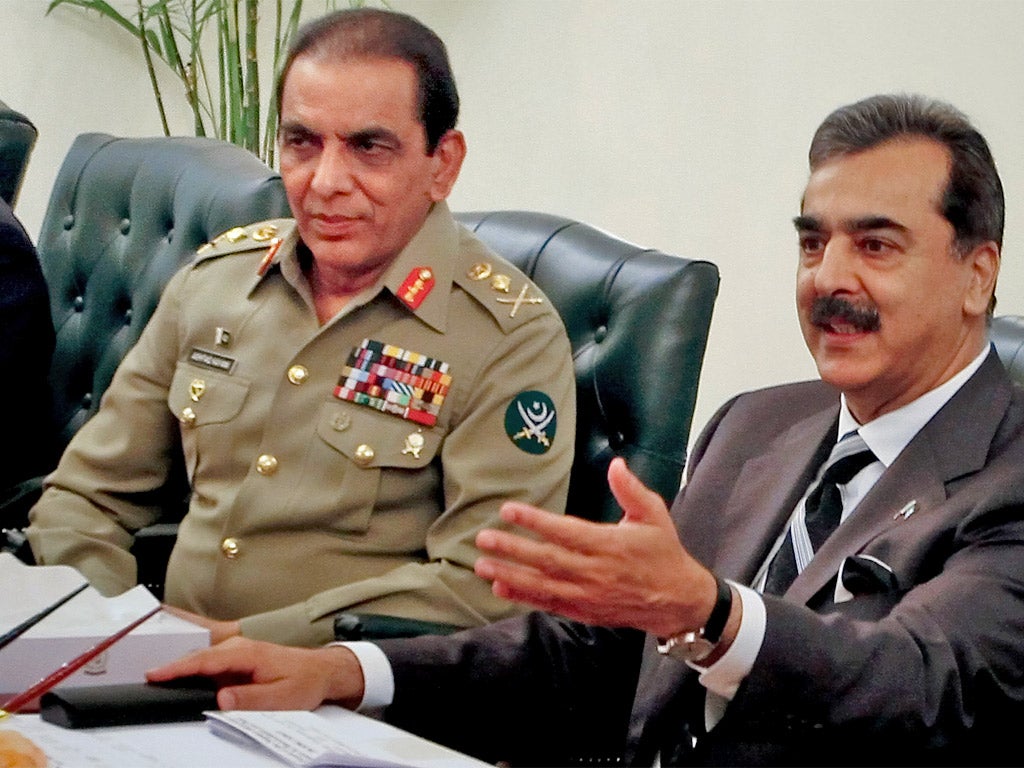Pakistan on edge as army threatens government
Recent comments by PM provoke retaliation in military's battle with civilian rulers

The dispute between Pakistan’s civilian administration and the military has erupted again after the army warned of “grievous consequences” for the country and the prime minister sacked the defence secretary.
In the latest twist in a row that has simmered for months, the army yesterday issued a statement that said recent comments made by prime minister Yousaf Raza Gilani had “very serious ramifications with potentially grievous consequences for the country”.
The army’s stern statement came after an increasingly bold Mr Gilani gave an interview to a Chinese newspaper in which he said the army chief, Gen Ashfaq Pervez Kayani, and the head of the military intelligence, Lt Gen Ahmed Shuja Pasha, had acted unconstitutionally by giving evidence to a supreme court investigation. He claimed they should have first sought the government's approval.
The dispute between the army and the government swirls around the ramifications of a memo sent last spring to the US military, allegedly at the behest of the Pakistani President Asif Ali Zardari. According to a US-Pakistani businessman who said he was asked to act as an intermediary, the note asked for assistance in reining in Pakistan’s generals and preventing them from launching a coup following the US raid that killed Osama bin Laden.
The fall-out from the so-called “memogate” affair has been extensive. The country’s ambassador to the US, Husain Haqqani, was forced to resign after he was accused of involvement in the memo, despite strident denials. Meanwhile, the supreme court has set up an investigatory panel to establish whether the note was sanctioned by Mr Zardari, something that could lead to possible impeachment. As part of the inquiry, Mr Kayani and Mr Pasha, along with many others, submitted statements to the court.
Yesterday, as the army issued its statement denouncing the prime minister, Mr Gilani announced that he was firing the country's defence secretary, Naeem Khalid Lodhi, a retired general who acted as bridge between the military and the civilian government. Lt Gen Lodhi was dismissed for what was described as “gross misconduct and illegal action” by submitting the statements of Mr Kayani and Mr Pasha to the court. He was replaced by a bureaucrat close to Mr Gilani.
The memogate row underlines the tension that has existed since a civilian government came to office in 2008, constantly jockeying for influence and power along side the army and an active judiciary headed by Chief Justice Iftikhar Chaudhry. Both Mr Chaudhry and Mr Kayani are known to have little time for President Zardari. Earlier this week, the supreme court issued a notice saying it could dismiss Mr Gilani if he did not follow an earlier directive to re-open corruption proceedings against the president.
The dispute has sparked constant and at times frenzied speculation of a possible coup, although some observers say they believe such a development is unlikely. Talat Masood, a political analyst and former general, said the flurry of statements was creating an “escalatory trend” towards collision. “You cannot have the major institutions of the state having a relationship of this sort,” he said. “I don’t think it can last too long...The country and the people will suffer as a result of this.”
Rasul Bakhsh Rais, a Lahore-based political analyst, said he believed the army would stay in its barracks and allow things to play out, preferring to try and change the civilian leadership through “soft” means. “I think the army will stay behind the supreme court,” he said. He said the court’s statements about Mr Gilani and Mr Zardari were so clear they would likely have to stand down.
Imran Khan, the former cricketer whose political fortunes have soared in recent months, told reporters last night that his party, the Pakistan Tehreek-e-Insaf, would not support any unconstitutional action by the army.
In another development some saw as ominous, the army has replaced the head of the Rawalpindi 111 Brigade, known for its prominent role in coups. The military said it was a routine matter.
Last night Mr Gilani sought to play down the split with the military.
"The Senate elections will be held on time, democracy will stay in Pakistan, democracy is in Pakistan's destiny now and all institutions will function under the government," he told reporters.
Join our commenting forum
Join thought-provoking conversations, follow other Independent readers and see their replies
Comments
Bookmark popover
Removed from bookmarks